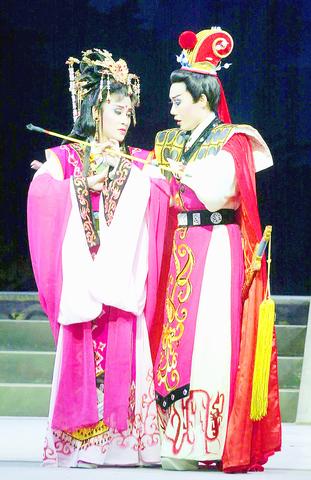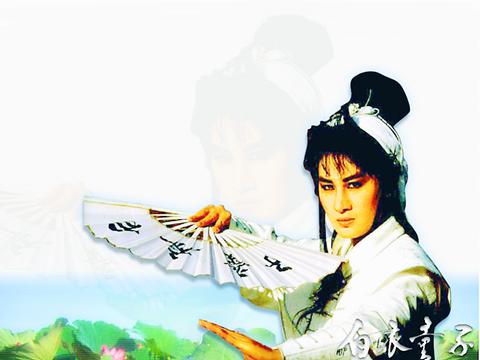The Taiwan session of the "2001 forum of cross-strait exchanges on Taiwanese Opera Development'' closed on Sept. 4 in Ilan, and the China session will begin in Zhangzhou (
As during previous seminars dealing with the issue, the debate over where Taiwanese Opera originated was inconclusive.

PHOTO: CHIANG YING-YING, TAIPEI TIMES
The Forum was organized by the Council for Cultural Affairs.

PHOTO: COURTESY OF YANG LI-HUA'S WEB SITE
Ilan-origin Theory
Scholars and researchers from both sides of the Strait agree that Kim Kua (錦歌), introduced by migrants from Zhangzhou to Tai-wan, during the Ming and Qing Dynasties, is the earliest form of Taiwanese Opera.
Researchers from China and Taiwan also acknowledge that Taiwanese Opera was greatly influenced by Peking Opera. During the 1910s, Peking Opera troupes from Shanghai and Fuzhou frequently came to perform in Taiwan. Some members of Peking Opera troupes later joined Taiwanese Opera troupes as opera directors or trainers.
Lin Mao-hsien (林茂賢), professor of the Department of Chinese Literature at Providence University, presented a paper based on the Ilan theory titled, "A study on local ballad" at the forum. Ilan theory suggests that Taiwanese Opera evolved from a minor form of opera called "Lo-deh Sao" (
According to Lin's paper, Tai-wanese Opera originated in Ilan. Lin cites three texts to support his argument. The paper notes that both the Annals of Ilan County and the Annals of Taiwan Province say that Taiwanese Opera originated in Ilan and that performances of Taiwanese Opera in Ilan had been reported in the Aug. 15, 1905 issue of the Taiwan Jih Jih Shin Po. In addition, Lo-deh Sao is still performed in Ilan
If Lin's theory is correct, Taiwanese Opera initially began as traditional ballad singing and then transformed into Lo-deh Sao; generally rendered by two or three singers and accompanied by a few musicians playing local instruments.
The plays took place for the most part at public squares in the countryside, in the courtyards of temples during ceremonies or in street parades. After Lo-Deh Sao absorbed performing styles and techniques from major operatic forms such as Chia-ko Lang (車鼓弄) and Ke-ka (高甲) and adopted instruments such as drums and gongs, it became a sophisticated opera in its own right, performed on stage.
Although doubts about Ilan theory have been raised within academic circles over the past 20 years, Ilan theory seems to have become widely accepted. A documentary by the National Taiwan Junior College of Performing Arts,which set up its own Taiwanese Opera department in 1994, credits Lo-deh Sao as the predecessor of Taiwanese Opera.
"Yes, we credit Lo-deh Sao as the original type of Taiwanese Opera because Ilan theory is well established and widely recognized," Lin Sien-yuan (林顯源), director of the department of Taiwanese Opera, told the Taipei Times.
The Council for Cultural Affairs also credits Ilan as the homeland of Taiwanese Opera, not only through organizing the forum in Ilan, but also by planning to set up the National Center for traditional arts in Ilan county.
Even Chinese scholars support Ilan theory. When commenting on Lin's paper at the forum, Chen Keng (
Tseng Shuehren (
"Before new evidence is found, Ilan theory has its logic. Taiwanese Opera is based on ballads from the mainland and adopted native Taiwanese music and folk tunes. It then developed into Taiwanese Opera," Tseng told the Taipei Times.
Skepticism in academic circles
One of the main challengers of Ilan theory, Lin ho-yi (
"Since Lo-deh Sao still exists in Ilan, while Taiwanese Opera has reached its peak and declined in the west [western Taiwan], apparently they are two different things," Lin ho-yi told the Taipei Times.
"Besides, the two annals on which Ilan theory is based were published quite recently. One was published in 1963 and the other in 1970. The conclusions based on the two annals were arrived at by a group of advocates of local historical research from Ilan," Lin ho-yi said.
"Certainly, Ilan theory is possible. It could be also possible that Taiwanese Opera evolved directly from ballad singing and by absorbing musical, performing, technical and artistic elements from other major forms of opera. From the point of view of the evolution of opera, the transformation of Taiwanese Opera did not have to go through a minor form of opera like Lo-deh Sao," Lin Ho-yi concluded.
Wang Shih-i (王士儀), professor of the department of Chinese drama at Chinese Cultural University, is even more critical, raising the theory that Taiwanese Opera came from Tataocheng (大稻埕) in Taipei.
"Economically, Ilan is too isolated to play such a major cultural role. How could such a poor district have the ability to influence the popularity of Taiwanese opera? Only an economically prosperous area could play such a role," Wang told the Taipei Times.
According to Wang's field study, Taiwanese Opera took place on a stage in front of a temple at Tataocheng and Ka-tzau Sien (
"Ka-tzau Sien was dancing Chia-ko Lang and replaced the spoken dialogue with singing, to escape official censorship. The flirting style of Chia-ko Lang was seen by the Japanese authorities as licentious," Wang said.
"Master Lee was already 12 years old when he witnessed the performance by Ka-tzau Sien in 1923, and he told me in person that Ka-tzau Sien was Tan Ka-tzau (陳嘉走) from Hsinchuang (新莊), instead of Tan Sum-gi (陳三儀) from Ilan."
Ka-tzau Sien is said to be the first theater director of Taiwanese Opera. Some believe Ka-tzau Sien was actually Tan Sum-gi.
Lau Siu-teng (
"In my field studies, I found some very old performing styles with similar costumes and music to the local ballads of Ilan. It means the same thing also existed in the west. The fact that Lo-deh Sao is still performed in Ilan only demonstrates the conservative character of Ilan," she said.
Taking History Seriously
With Taiwanese Opera gradually losing its audience, academics and young intellectuals are worried about its survival. In order to save a performing art so dear to Taiwanese society, some young intellectuals devote their time to research and performance.
In February of last year, the first Taiwanese Opera to narrate the love story of a young Han immigrant from China with an Aboriginal girl of the Ping-pu tribe was brought to the stage at the National Theater. The opera, roughly translated as When the Carol Tree Blossoms (
"Beforehand, Taiwanese Opera depicted only ancient Chinese stories and had never seriously dealt with Taiwanese history. Since Taiwanese Opera is a native [pre-World War II] performing art, we should add more localized elements into the play," Lao said, commenting on the new opera.
Script writer Yang Sing-chi (
Before Han immigrants began to arrive in Taiwan, the Ping-pu were indigenous people who lived on the western plains and along the western coast.
Dubbed "ripe savages" by Han immigrants, the Ping-pu were peasants and fishermen who lived on the plains -- in contrast to people living in mountainous areas, who were known as "raw savages."
Since Han immigrants were mostly desperate and unmarried, many young Han men intermarried with the Ping-pu in order to exploit the tribe's land and property.
The social structure of the Ping-pu tribe met the ambitions of Chinese immigrant bachelors perfectly.
To marry a Ping-pu woman was an obvious solution for most of these immigrants. The Ping-pu tribe was a matriarchal society in which property was inherited by the daughter.
Through cultural interaction and interracial marriages, the Ping-pu tribe finally disappeared in the early 20th century. The blossoming of the carol trees were used by the Ping-pu as a functioning calendar to mark the beginning of another year.
The eternal star
During the 1970s it was a national pastime to watch TV when Taiwanese Opera programs aired.
In the Qing Dynasty, women were forbidden by law to perform on stage. All roles in the opera were played by men. After 1911, women quickly replaced men and dominated the stage.
The real stars in a troupe are the female performers who play the lead male roles. These women are usually slim and have deep voices.
Among all of the opera performers who have appeared on TV, perhaps the most famous was Yang Li-hua (楊麗花), who has studied Taiwanese Opera since his childhood.
In 1983, she married orthopedist Hong Wen-tong (洪文棟), who later became a legislator. When the wedding ceremony took place at the Grand Hotel, the hotel was filled with celebrities, invited guests and crowds of fans.
One of the presiding witnesses was then-provincial governor and now retired president Lee Teng-hui (李登輝).

MAKING WAVES: China’s maritime militia could become a nontraditional threat in war, clogging up shipping lanes to prevent US or Japanese intervention, a report said About 1,900 Chinese ships flying flags of convenience and fishing vessels that participated in China’s military exercises around Taiwan last month and in January have been listed for monitoring, Coast Guard Administration (CGA) Deputy Director-General Hsieh Ching-chin (謝慶欽) said yesterday. Following amendments to the Commercial Port Act (商港法) and the Law of Ships (船舶法) last month, the CGA can designate possible berthing areas or deny ports of call for vessels suspected of loitering around areas where undersea cables can be accessed, Oceans Affairs Council Minister Kuan Bi-ling (管碧玲) said. The list of suspected ships, originally 300, had risen to about 1,900 as

Japan’s strategic alliance with the US would collapse if Tokyo were to turn away from a conflict in Taiwan, Japanese Prime Minister Sanae Takaichi said yesterday, but distanced herself from previous comments that suggested a possible military response in such an event. Takaichi expressed her latest views on a nationally broadcast TV program late on Monday, where an opposition party leader criticized her for igniting tensions with China with the earlier remarks. Ties between Japan and China have sunk to the worst level in years after Takaichi said in November that a hypothetical Chinese attack on Taiwan could bring about a Japanese

MORE RESPONSIBILITY: Draftees would be expected to fight alongside professional soldiers, likely requiring the transformation of some training brigades into combat units The armed forces are to start incorporating new conscripts into combined arms brigades this year to enhance combat readiness, the Executive Yuan’s latest policy report said. The new policy would affect Taiwanese men entering the military for their compulsory service, which was extended to one year under reforms by then-president Tsai Ing-wen (蔡英文) in 2022. The conscripts would be trained to operate machine guns, uncrewed aerial vehicles, anti-tank guided missile launchers and Stinger air defense systems, the report said, adding that the basic training would be lengthened to eight weeks. After basic training, conscripts would be sorted into infantry battalions that would take

DEEP-STRIKE CAPABILITY: The scenario simulated a PLA drill that turned into an assault on Taiwan’s critical infrastructure, with the launchers providing fire support Taiwan yesterday conducted this year’s first military exercises at Longsiang Base in Taichung, demonstrating the newly acquired High Mobility Artillery Rocket System’s (HIMARS) ability to provide fire support and deep-strike capabilities. The scenario simulated an attack on Penghu County, with HIMARS trucks immediately rolling into designated launch areas and firing barrages at the Wangan (望安) and Cimei (七美) islands, simulating the provision of fire support against invading forces. The HIMARS are supposed to “fire and leave,” which would significantly increase personnel and equipment survivability, a military official said. The drill simulated an exercise launched by the Chinese People’s Liberation Army (PLA) Eastern